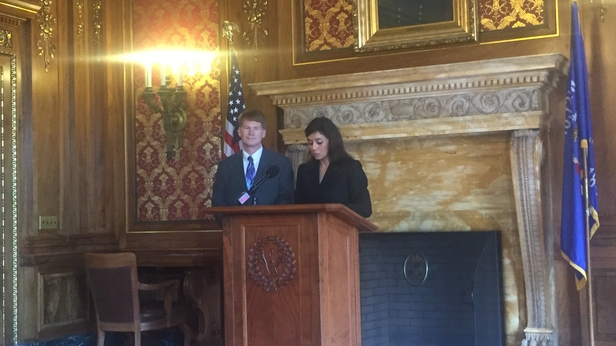
Members focused on early childhood education, mental health, truancy and behavior problems, and teacher training, recruitment, and retention
MacIver News Service | June 15, 2016
The Speaker’s Task Force on Urban Education to release its final report today. @RepJessie @WIAssemblyGOP
— Speaker Robin Vos (@SpeakerVos) June 15, 2016
“It is our hope that the recommendations will be considered during the next legislative session or addressed in the biennial budget,” Rep. Rodriguez said. “We have shared a commitment to improving student outcomes in our schools, and we all want every student to succeed. Today’s students are the future leaders of Wisconsin, the next generation of our workforce, and the bright minds of tomorrow.
The task force’s recommendations are as follows:
-
- Reevaluate the Peer Review Mentor Grant Program
-
- Streamline the license renewal process for experienced teachers who serve as mentors to new teachers
-
- Encourage teacher preparatory programs to provide instruction in how to teach in urban settings and in how to teach reading to all teacher license applicants
-
- Clarify the definitions of “truancy” and “habitual truancy” and specify what constitutes sufficient evidence to initiate a court proceeding without providing a student with educational counseling or other evaluative services
-
- Explore creating a Medicaid Billing Code for consultation time between mental health care providers, parents, and school personnel
-
- Investigate barriers to communication about a student’s mental health between physicians and mental health care professionals
-
- Review the collegiate transfer programs between the technical colleges in the Wisconsin Technical College System (WTCS) and the UW System
-
- Review state funding to school districts for summer school
-
- Review the state requirement that school districts report pupil nondiscrimination data
-
- Consider funding interim assessments and academic interventions
-
- Evaluate the potential to permit schools and school districts to accept student scores from ACT assessments taken at any time during a student’s 11th grade year for accountability purposes
-
- Review state funding for four-year-old kindergarten and explore additional options for investing in early childhood education
Rep. Rodriguez was joined by Rep. Jeremy Thiesfeldt (R-Fond du Lac), Chairman of the Assembly Committee on Education, who also served on the Speaker’s Task Force. In his remarks, Thiesfeldt touched on the individualization of education, which he sees as the future of education.
“For many years we’ve had this kind of factory model of education and that is slowly but surely changing,” Thiesfeldt said. “That’s a difficult transition in some cases, because you have to have educators who buy into that and are willing to take the training that’s involved. And you also have to have parents that believe this is the right way to go because it’s not the same school they went to, it’s not the same style of teaching and learning as they experienced when they went to school.”
For many years we have had a factory model of education, in many ways that’s changing – @Thiesfeldt on the future of #education #wipolitics
— MacIver Institute (@MacIverWisc) June 15, 2016
“This task force is helping with that public awareness to bring people to the realization that education as a whole is changing,” Thiesfeldt said. “But the parts of our education system where there still seem to be the most struggles are our urban areas, and we need to pay some special attention there.”